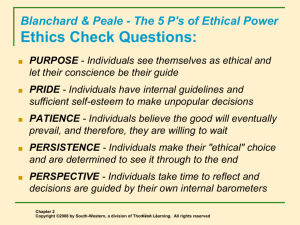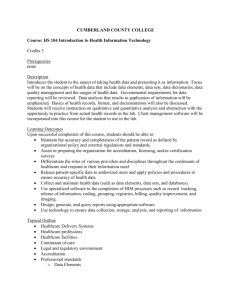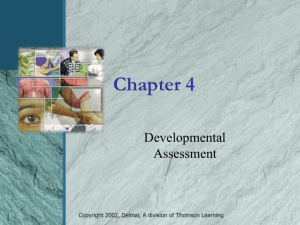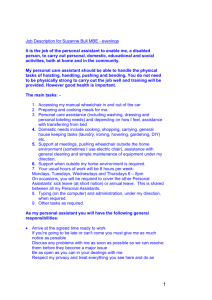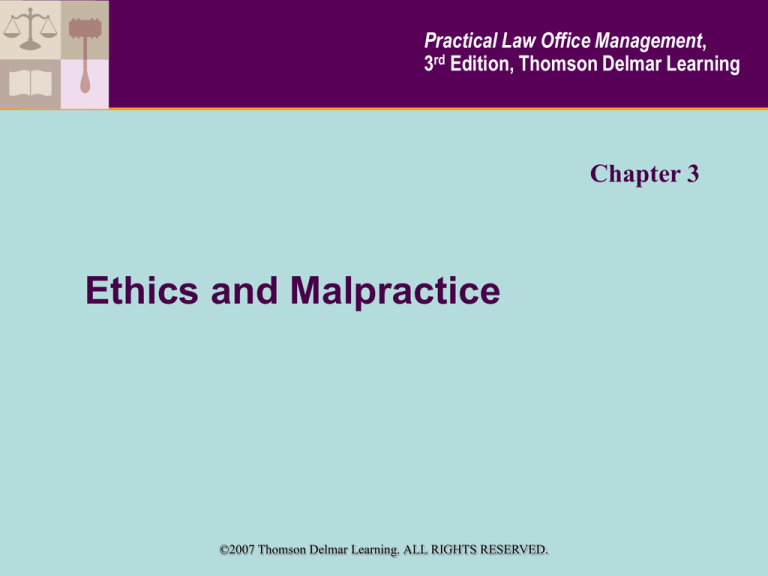
Practical Law Office Management,
3rd Edition, Thomson Delmar Learning
Chapter 3
Ethics and Malpractice
©2007 Thomson Delmar Learning. ALL RIGHTS RESERVED.
Why Is Ethics Important
to Legal Assistants?
•
Clients and attorneys must have total confidence
that a legal assistant understands ethical
problems and that a legal assistant’s ethical
judgment is clear.
•
An error by a legal assistant can be very costly in
terms of:
–
–
–
2
1) Hurting the client and subjecting the attorney to a
malpractice claim
2) Subjecting the attorney to a disciplinary complaint
3) A legal assistant being terminated from his or her job
©2007 Thomson Delmar Learning. ALL RIGHTS RESERVED.
Ethical Standards for
Attorneys
•
Attorneys that violate ethical standards may be
subject to discipline including permanent
disbarment, temporary suspension, public
censure, or an informal reprimand.
•
The ABA’s Model Rules of Professional
Conduct is an ethical standard that is used in
one form or another in nearly all states.
•
States are free to create their own rules of
conduct for attorneys, but many simply modify
one of the ABA’s ethical models.
3
©2007 Thomson Delmar Learning. ALL RIGHTS RESERVED.
Attorney Ethical Rules Do Not Apply
Directly to Legal Assistants
•
Neither a state’s canons of ethics nor the ABA’s ethical
rules apply directly to legal assistants.
•
Attorneys can be disciplined for the acts of their legal
assistants since attorneys have the duty to adequately
supervise their staff.
•
Attorneys cannot avoid ethical rules and accomplish an
unethical act by delegating or allowing a staff member to
do the act.
•
Although a legal assistant cannot be disciplined by a
state regulatory body, he or she can be terminated by the
attorney and/or criminally charged with the unauthorized
practice of law, and some courts have even upheld civil
damages against legal assistants for negligence.
4
©2007 Thomson Delmar Learning. ALL RIGHTS RESERVED.
Voluntary Legal Assistant
Ethical Codes - NALA
NALA Code of Ethics and Professional Responsibility
• A legal assistant must adhere strictly to the accepted standards of
legal ethics and to the general principles of proper conduct. The
performance of the duties of the legal assistant shall be governed by
specific canons as defined herein so that justice will be served and
goals of the profession attained. (See Model Standards and
Guidelines for Utilization of Legal Assistants, Section II.)
•
The canons of ethics set forth hereafter are adopted by the National
Association of Legal Assistants, Inc., as a general guide intended to
aid legal assistants and attorneys. The enumeration of these rules
does not mean there are not others of equal importance, although not
specifically mentioned. Court rules, agency rules, and statutes must
be taken into consideration when interpreting the canons.
•
Definition: Legal assistants, also known as paralegals, are a
distinguishable group of persons who assist attorneys in the delivery
of legal services. Through formal education, training, and experience,
legal assistants have knowledge and expertise regarding the legal
system and substantive and procedural law which qualify them to do
work of a legal nature under the supervision of an attorney.
5
©2007 Thomson Delmar Learning. ALL RIGHTS RESERVED.
Voluntary Legal Assistant
Ethical Codes - NALA
•
Canon 1. A legal assistant must not perform any of the duties that
attorneys only may perform nor take any actions that attorneys may
not take.
•
Canon 2. A legal assistant may perform any task which is properly
delegated and supervised by an attorney, as long as the attorney is
ultimately responsible to the client, maintains a direct relationship with
the client, and assumes professional responsibility for the work
product.
•
Canon 3. A legal assistant must not:
(a) engage in, encourage, or contribute to any act which could constitute the
unauthorized practice of law; and
(b) establish attorney-client relationships, set fees, give legal opinions or
advice, or represent a client before a court or agency unless so authorized
by that court or agency; and,
(c) engage in conduct or take any action which would assist or involve the
attorney in a violation of professional ethics or give the appearance of
professional impropriety.
6
©2007 Thomson Delmar Learning. ALL RIGHTS RESERVED.
Voluntary Legal Assistant
Ethical Codes - NALA
•
Canon 4. A legal assistant must use discretion and professional
judgment commensurate with knowledge and experience but must not
render independent legal judgment in place of an attorney. The
services of an attorney are essential in the public interest whenever
such legal judgment is required.
•
Canon 5. A legal assistant must disclose his or her status as a legal
assistant at the outset of any professional relationship with a client,
attorney, a court or administrative agency or personnel thereof, or a
member of the general public. A legal assistant must act prudently in
determining the extent to which a client may be assisted without the
presence of an attorney.
•
Canon 6. A legal assistant must strive to maintain integrity and a high
degree of competency through education and training with respect to
professional responsibility, local rules and practice, and through
continuing education in substantive areas of law to better assist the
legal profession in fulfilling its duty to provide legal service.
7
©2007 Thomson Delmar Learning. ALL RIGHTS RESERVED.
Voluntary Legal Assistant
Ethical Codes - NALA
•
Canon 7. A legal assistant must protect the confidences of a
client and must not violate any rule or statute now in effect or
hereafter enacted controlling the doctrine of privileged
communications between a client and an attorney.
•
Canon 8. A legal assistant must do all other things incidental,
necessary, or expedient for the attainment of the ethics and
responsibilities as defined by statute or rule of court.
•
Canon 9. A legal assistant’s conduct is guided by bar
associations’ codes of professional responsibility and rules of
professional conduct.
8
©2007 Thomson Delmar Learning. ALL RIGHTS RESERVED.
Voluntary Legal Assistant
Ethical Codes - NFPA
•
The National Federation of Paralegal Associations, Inc. (NFPA) is a
professional organization comprised of paralegal associations and
individual paralegals throughout the United States and Canada.
Members of NFPA have varying backgrounds, experiences,
education, and job responsibilities that reflect the diversity of the
paralegal profession. NFPA promotes the growth, development, and
recognition of the paralegal profession as an integral partner in the
delivery of legal services.
•
In May 1993 NFPA adopted its Model Code of Ethics and
Professional Responsibility (Model Code) to delineate the principles
for ethics and conduct to which every paralegal should aspire.
•
Many paralegal associations throughout the United States have
endorsed the concept and content of NFPA’s Model Code through
the adoption of their own ethical codes. In doing so, paralegals have
confirmed the profession’s commitment to increase the quality and
efficiency of legal services, as well as recognized its responsibilities
to the public, the legal community, and colleagues.
9
©2007 Thomson Delmar Learning. ALL RIGHTS RESERVED.
Voluntary Legal Assistant
Ethical Codes - NFPA
•
Paralegals have recognized, and will continue to recognize, that the
profession must continue to evolve to enhance their roles in the
delivery of legal services. With increased levels of responsibility
comes the need to define and enforce mandatory rules of
professional conduct. Enforcement of codes of paralegal conduct is a
logical and necessary step to enhance and ensure the confidence of
the legal community and the public in the integrity and professional
responsibility of paralegals.
•
In April 1997 NFPA adopted the Model Disciplinary Rules (Model
Rules) to make possible the enforcement of the Canons and Ethical
Considerations contained in the NFPA Model Code. A concurrent
determination was made that the Model Code of Ethics and
Professional Responsibility, formerly aspirational in nature, should be
recognized as setting forth the enforceable obligations of all
paralegals.
•
The Model Code and Model Rules offer a framework for professional
discipline, either voluntarily or through formal regulatory programs.
10
©2007 Thomson Delmar Learning. ALL RIGHTS RESERVED.
Voluntary Legal Assistant
Ethical Codes - NFPA
•
§1. NFPA model disciplinary rules and ethical considerations
•
1.1
A paralegal shall achieve and maintain a high level of
competence.
•
1.2
A paralegal shall maintain a high level of personal and
professional integrity.
•
1.3 A paralegal shall maintain a high standard of professional
conduct.
•
1.4 A paralegal shall serve the public interest by contributing
to the improvement of the legal system and delivery of quality
legal services, including pro bono publico services.
11
©2007 Thomson Delmar Learning. ALL RIGHTS RESERVED.
Voluntary Legal Assistant
Ethical Codes - NFPA
•
1.5
A paralegal shall preserve all confidential information
provided by the client or acquired from other sources before,
during, and after the course of the professional relationship.
•
1.6
A paralegal shall avoid conflicts of interest and shall
disclose any possible conflict to the employer or client, as well
as to the prospective employers or clients.
•
1.7
•
1.8 A paralegal shall not engage in the unauthorized practice
of law.
12
A paralegal’s title shall be fully disclosed.
©2007 Thomson Delmar Learning. ALL RIGHTS RESERVED.
Unauthorized Practice of
Law
The “PRACTICE OF LAW”
• Giving legal advice
• Representing clients in court proceedings
• Performing legal analysis (with no supervision)
• Preparing legal documents (with no
supervision)
• Evaluating a case and selecting an
appropriate course of action
• Accepting or rejecting a case
• Setting a fee
13
©2007 Thomson Delmar Learning. ALL RIGHTS RESERVED.
Unauthorized Practice of
Law
OTHER WORK IN A LAW OFFICE
•
•
•
•
•
•
•
•
•
•
14
Obtaining facts from client
Communicating information to the client
Interviewing witnesses
Performing limited legal research to assist an attorney
with legal analysis
Obtaining documents
Preparing drafts of requests for production of document
Preparing drafts of interrogatories
Preparing drafts of responses to requests for production
of documents
Preparing drafts of responses to interrogatories
Preparing drafts of pleadings
©2007 Thomson Delmar Learning. ALL RIGHTS RESERVED.
Unauthorized Practice of
Law
OTHER WORK IN A LAW OFFICE
•
•
•
•
•
•
•
•
•
15
Organizing documents and evidence
Preparing case chronologies
Preparing deposition summaries
Preparing exhibit lists
Organizing and tracking deadlines
Conducting factual research on the Internet
Designing/entering/searching data in a litigation support
database
Working with preparing e-discovery requests/software
Preparing trial presentations and demonstrative evidence
©2007 Thomson Delmar Learning. ALL RIGHTS RESERVED.
Tips to Avoid the Unauthorized
Practice of Law
•
•
•
•
•
•
•
16
Always have your work approved by a
supervising attorney.
Never let clients talk you into giving the client
legal advice.
Do not start sentences with “You should” or “I
think.”
Always clearly identify yourself as a legal
assistant.
Do not set the fees in a case by yourself.
Do not accept a case by yourself.
Do not appear in court or represent a client
before a court alone (unless specifically
allowed to by the rules of the jurisdiction).
©2007 Thomson Delmar Learning. ALL RIGHTS RESERVED.
Competence and
Diligence
•
1. Legal assistants and attorneys must perform
legal services in a competent manner.
–
•
ABA Model Rule 1.1 states: “Competence: A lawyer
shall provide competent representation to a client.
Competent representation requires the legal
knowledge, skill, thoroughness, and preparation
reasonably necessary for the representation.”
2. Legal assistants and attorneys must perform
legal services in a diligent manner.
–
17
ABA Model Rule 1.3 states: “Diligence: A lawyer shall
act with reasonable diligence and promptness in
representing a client.”
©2007 Thomson Delmar Learning. ALL RIGHTS RESERVED.
Client Confidentiality
•
The attorney-client privilege is a rule of
evidence that precludes the disclosure of
confidential communication between a
lawyer and a client by the lawyer.
• For the privilege to be invoked, the
communication must have been made in
confidence between the client and the
attorney for the purpose of obtaining legal
advice.
18
©2007 Thomson Delmar Learning. ALL RIGHTS RESERVED.
Client Confidentiality
•
Ethical rules prohibit lawyers from revealing
confidential information about clients.
–
–
19
ABA Model Rule 1.6(a) states: “A lawyer shall not
reveal information relating to the representation of a
client unless the client gives informed consent. . . .”
ABA Model Code DR 4-101(D) states: “A lawyer
shall exercise reasonable care to prevent his
employees, associates, and others whose services
are utilized by him from disclosing or using
confidences or secrets of a client. . . .”
©2007 Thomson Delmar Learning. ALL RIGHTS RESERVED.
Client Confidentiality
Tips
•
Resist the temptation to talk about what
goes on in the law office, whether or not it is
client related.
• Only talk about client matters to other law
office personnel on a need-to-know basis.
• Never
discuss the specific facts or
circumstances of a client’s case to anyone,
not even friends or relatives. The statement
“I promise I won’t tell anyone” does not work.
• Always clear your desk of other case files
when meeting with a client.
20
©2007 Thomson Delmar Learning. ALL RIGHTS RESERVED.
Client Confidentiality
Tips
•
Do not take phone calls from other clients
when meeting with a client.
• Do not talk about cases in public places
such as elevators or public hallways.
• Be careful when responding to discovery
requests so as not to produce confidential
client information.
• Be careful using fax machines, e-mail,
mobile telephones, and so forth, so as not to
disclose confidential information.
21
©2007 Thomson Delmar Learning. ALL RIGHTS RESERVED.
Conflict of Interest
•
A conflict of interest occurs when an attorney or
legal assistant has competing personal or
professional interests with a client’s case that would
preclude him or her from acting impartially toward
the client.
•
Conflict of interest problems occur when:
–
An attorney or legal assistant has a personal,
financial, or other interest in a case.
– The attorney or legal assistant sometime in the past
represented a client who is now an adverse party in a
current case.
– An attorney and a client enter into business together.
22
©2007 Thomson Delmar Learning. ALL RIGHTS RESERVED.
Conflict of Interest
•
Rule 1.7 of the ABA Model Rules states:
– a) . . . A lawyer shall not represent a client if the
representation involves a concurrent conflict of interest. A
concurrent conflict of interest exists if:
• (1) the representation of one client will be directly
adverse to another client; . . .
– b) Notwithstanding the existence of a concurrent
conflict . . . a lawyer may represent a client if:
• (1) the lawyer reasonable believes that the lawyer will
be able to provide competent and diligent
representation to each affected client; . . .
• (4) each affected client gives informed consent,
confirmed in writing.
23
©2007 Thomson Delmar Learning. ALL RIGHTS RESERVED.
Conflict of Interest
•
Rule 1.8 of the ABA Model Rules states:
–
(a)
A lawyer shall not enter into a business
transaction with a client or knowingly acquire
an ownership, possessory, security, or other
pecuniary interest adverse to a client
unless . . .
– (b)
A lawyer shall not use information
relating to representation of a client to the
disadvantage of the client unless the client
gives informed consent.
24
©2007 Thomson Delmar Learning. ALL RIGHTS RESERVED.
Conflict of Interest
The Ethical Wall
• a.
The general rule is that courts tend to disqualify a whole
firm when a conflict of interest problem arises. However,
some courts have carved out an alternative to disqualification.
The alternative is called the Ethical or Chinese Wall theory.
•
b. The ethical alternative occurs when a firm effectively
isolates the legal assistant or attorney with a conflict of
interest from having anything whatsoever to do with the case,
creating an “Ethical Wall” around him or her.
•
c. An Ethical Wall is put in place by instructing staff
members not to talk to the person with the conflict about the
case and by limiting the person’s access to the files (including
computer files) of the case.
25
©2007 Thomson Delmar Learning. ALL RIGHTS RESERVED.
Conflict of Interest
•
Conflict of interest problems for legal
assistants usually occur when a legal assistant
changes employment.
• Legal assistants can avoid conflict of interest
problems when changing employment by:
–
–
–
26
Bringing up the issue of potential conflicts in the job
interview.
Being absolutely honest about his or her past.
If a potential conflict is discovered, the legal
assistant should immediately inform the supervisor
of the potential conflict.
©2007 Thomson Delmar Learning. ALL RIGHTS RESERVED.
Resolving Ethical
Problems
•
Talk to your legal assistant manager or
supervising attorney regarding the ethical
problem.
• Talk to another attorney or legal assistant in the
firm regarding the ethical problem.
• Join a professional legal assistant association
that covers ethical issues.
• Be familiar with the ethical rules of your state.
27
©2007 Thomson Delmar Learning. ALL RIGHTS RESERVED.
Resolving Ethical
Problems
•
Subscribe to legal assistant periodicals that
deal with ethical issues.
• Report ethical violations to the state bar
association if necessary.
• When considering ethical questions, think
conservatively and do not take chances.
• Do not ignore or procrastinate regarding the
ethical problem.
28
©2007 Thomson Delmar Learning. ALL RIGHTS RESERVED.
Malpractice
•
29
Legal malpractice occurs when an attorney’s
or law office’s conduct in representing a
client falls below the standard skill,
prudence, and diligence that an ordinary
lawyer would possess or that is commonly
available in the legal community.
©2007 Thomson Delmar Learning. ALL RIGHTS RESERVED.
Malpractice
The most common causes of legal malpractice
include:
–
Failure to know/properly apply law
– Failure to know/ascertain deadline
– Failure to obtain consent/inform client
– Failure to calendar properly
30
©2007 Thomson Delmar Learning. ALL RIGHTS RESERVED.
Malpractice Avoidance
Tips
•
•
•
•
•
31
Return client phone calls immediately.
Send clients status reports about their
cases.
Contact clients regularly and ask them for
their opinions about how to proceed with the
case.
Always reduce fee agreements to writing.
Always send regular billings to clients so
they do not get “sticker shock.”
©2007 Thomson Delmar Learning. ALL RIGHTS RESERVED.
Malpractice Avoidance
Tips
•
Resolve fee disputes, if possible.
• Do not work on cases that you are not
qualified to handle.
• When a case is accepted, always send an
engagement letter.
• When a case is rejected or a case is closed,
always send a disengagement letter.
32
©2007 Thomson Delmar Learning. ALL RIGHTS RESERVED.


